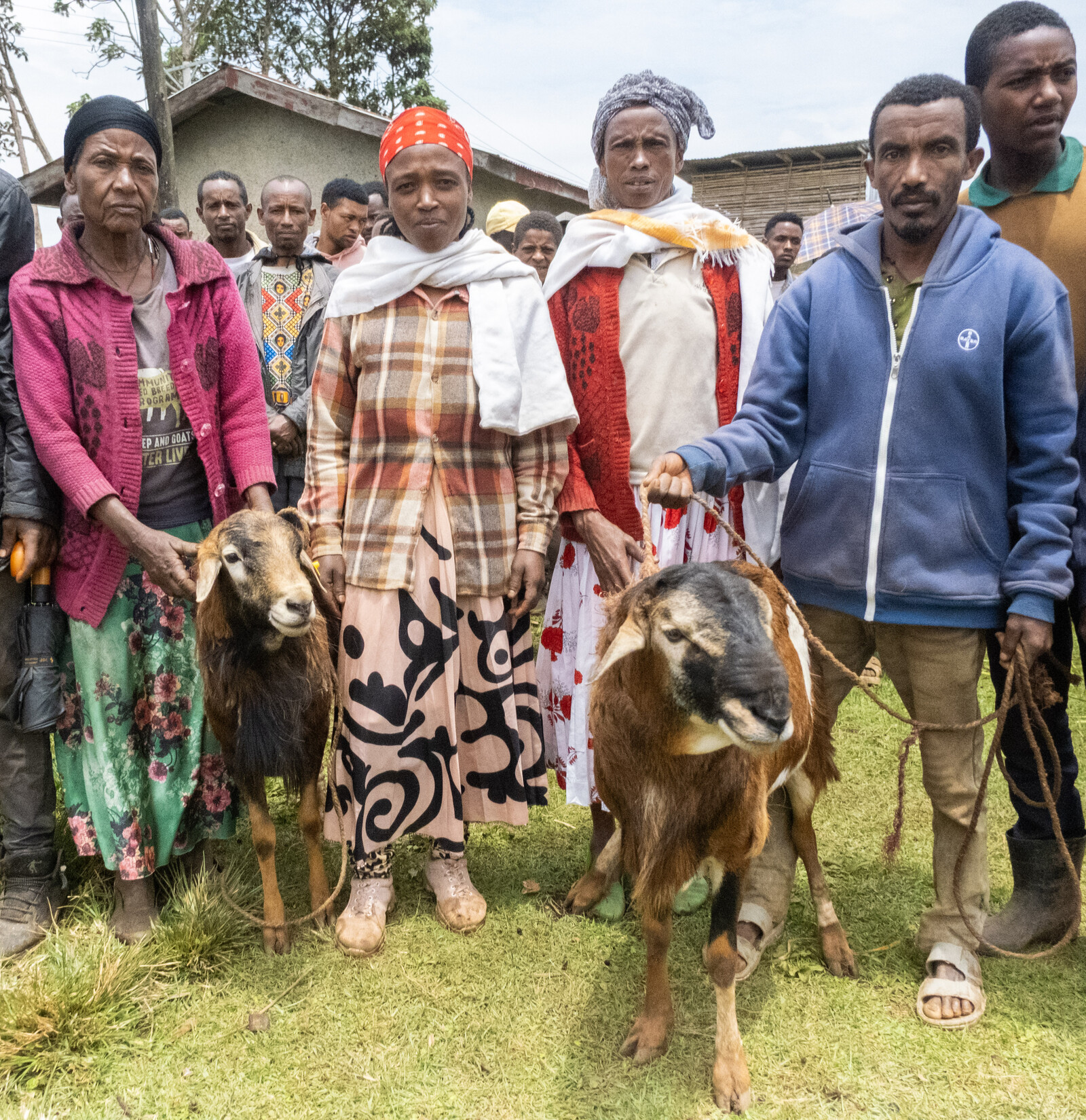<p></p>
<img data-entity-type=”file” data-entity-uuid=”f7255b83-7ff1-4d61-8ea0-ecb37f410428″ height=”3241″ src=”https://www.ilri.org/sites/default/files/inline-images/A%20young%20Borana%20woman%20with%20her%20goats%2C%20Borana%2C%20Ethiopia_%20Photo%20Credit%20ILRI%20Zerihun%20Sewunet.jpg” width=”4861″>
Figure 1. A young Borana woman with her goats, Borana, Ethiopia. Photo credit: ILRI/ Zerihun Sewunet
<p>In many parts of rural Ethiopia, livestock are more than just a source of food or income, and they are a pathway to dignity, opportunity, and empowerment. For women, who often face barriers in accessing land, credit, and markets, small ruminants like sheep and goats present a unique opportunity to shift the dynamics of rural livelihoods. Beyond their economic value, they are also a practical entry point for promoting gender equity, as women are primary care-takers and are deeply involved in their day-to-day management, processing, and sales of the animals and their products. In recent years, a regional project has begun to unlock this potential by intentionally placing women at the center of livestock interventions.</p>
<h3>About the project</h3>
<p>The initiative, ‘<a href=”https://www.aciar.gov.au/project/ls-2020-152″>Strengthening Adaptive Capacity of Extensive Livestock Systems for Food and Nutrition Security and Low-Emissions Development in Eastern and Southern Africa</a>’ is funded by the <a href=”https://www.aciar.gov.au/”>Australian Centre for International Agricultural Research (ACIAR)</a>. It is being implemented across Ethiopia, Kenya, and Zimbabwe to support more climate-resilient and inclusive livestock systems. In Ethiopia, the project is implemented by <a href=”https://www.unique-landuse.de/en/”>Unique Land Use</a> in collaboration with the International Livestock Research Institute (ILRI) and the <a href=”https://icarda.org/”>International Center for Agricultural Research in the Dry Areas (ICARDA)</a>. </p>
<p>At its core, the project supports pastoral and smallholder communities in adopting sustainable and scalable livestock interventions that enhance food and nutrition security, improve adaptive capacity, and reduce greenhouse gas emissions in a gender-sensitive manner.</p>
<p>Central to its approach is a cross-cutting <a href=”https://hdl.handle.net/10568/148806″>Gender Equality Strategy</a>, which ensures that women and marginalized groups are intentionally included in all planning, implementation, and decision-making aspects.</p>
<p>In Ethiopia, sheep and goats, in particular, are often managed by women and resource-poor families. Their short reproductive cycles, adaptability to dry conditions, and low input requirements make them especially suitable for vulnerable communities in arid and semi-arid regions.</p>
<p>The project explores three focus areas in depth: community-based breeding programs, animal health intervention, and market access enhancement.</p>
<h3>Community-Based Breeding Programs (CBBP)</h3>
<p>Community-Based Breeding Programs (CBBPs) aim to improve local breeds of sheep and goats through participatory genetic selection. ICARDA and its national partners mainly lead CBBP efforts. While these programs have proven technical benefits in increasing productivity, their real impact lies in their ability to shift social norms, particularly around women’s roles in livestock management.</p>
<p></p>
<img alt=”Figure 2. Community-based breeders in Bonga. Photo credit: ILRI/ Brook Makonnen” data-entity-type=”file” data-entity-uuid=”3d4d1061-fd7b-493d-a2ef-ffbe3aeadc66″ height=”4160″ src=”https://www.ilri.org/sites/default/files/inline-images/Community-based%20breeders%20in%20Bonga.%20Photo%20credit%20ILRI%20Brook%20Makonnen.jpg” width=”4033″>
Figure 2. Community-based breeders in Bonga. Photo credit: ILRI/ Brook Makonnen
<p>Women are being trained in all aspects of the breeding programs, from animal selection to record keeping. Dedicated women-led CBBPs (wCBBPs) have been established to provide leadership opportunities and safe spaces for women to engage more actively. In mixed male and female CBBPs women are increasingly appointed to leadership positions within cooperatives, where they contribute to governance and strategic decisions.</p>
<blockquote><p>“Participating in the sheep community-based breeding program enables me to get a better income, discuss with our neighbours outside my home, and educate my children,” said a woman farmer from the Tsehaysina villages involved in the Menz sheep community-based breeding program.</p>
</blockquote>
<p>As a result, many women have reported increased income from improved sheep and goat sales. This financial independence has translated into stronger voices in household decision-making, greater social visibility, and better outcomes for their children, including education and nutrition. Some male household members have also undergone training to recognize and support women’s contributions to family welfare and economic growth.</p>
<h3>Animal health interventions</h3>
<p>In rural communities, access to reliable animal health services is often limited, especially for women. This project seeks to close that gap by training and deploying community animal health workers—both men and women—to offer practical, accessible care. These trained workers support smallholder farmers with guidance on disease prevention, treatment, deworming, and vaccinations.</p>
<p>There is also a growing role for female veterinary graduates. In partnership with initiatives like the Health of Ethiopian Animals for Rural Development (HEARD) project, women professionals actively contribute to gender-responsive animal health service delivery, for instance in Degahabour district, Somali region, Ethiopia. Special attention is given to women-headed households, ensuring they can access and afford the necessary services to maintain healthy, productive flocks.</p>
<p></p>
<img alt=”Figure 3. Learning event during a recent event in Bonga. Photo credit: ILRI/ Brook Makonnen” data-entity-type=”file” data-entity-uuid=”9134caee-558f-4bbf-bb9e-2a0becffbae4″ height=”1365″ src=”https://www.ilri.org/sites/default/files/inline-images/Learning%20event%20during%20a%20recent%20event%20in%20Bonga.%20Photo%20credit%20ILRI%20Brook%20Makonnen.jpg” width=”2048″>
Figure 3. Learning event during a recent event in Bonga. Photo credit: ILRI/ Brook Makonnen
<p>The study confirms that targeted animal health interventions significantly enhance women’s empowerment, particularly through improved veterinary services and specialized training that builds women’s knowledge and decision-making capacity in livestock production. Women-only programs proved more effective than mixed-gender approaches, with empowered women demonstrating greater adoption of animal health practices, creating a virtuous cycle of empowerment and livestock health improvement. This inclusive approach improves the well-being of animals and strengthens women’s confidence and capability to manage their livestock effectively. Healthy animals lead to higher yields, more stable incomes, and improved food security.</p>
<h3>Enhancing market access</h3>
<p>A critical barrier for many rural women livestock keepers is the lack of market access. Often, women produce but do not sell; men dominate market interactions and control the revenue. This project addresses this imbalance by building women’s knowledge of market systems and strengthening their ability to participate in and benefit from livestock sales.</p>
<p></p>
<img alt=”Figure 4. Digital market platform demonstration by Yazerbet, a private company involved in the sales of sheep and goat in Addis Ababa. Photo credit: ILRI/ Brook Makonnen” data-entity-type=”file” data-entity-uuid=”6fecfae3-aca9-4196-a382-0db5848fbacf” height=”4161″ src=”https://www.ilri.org/sites/default/files/inline-images/Digital%20market%20platform%20demonstration%20by%20Yazerbet%2C%20a%20private%20company%20involved%20in%20selling%20sheep%20and%20goat%20in%20Addis%20Ababa.%20Photo%20credit%20ILRI%20Brook.jpg” width=”6240″>
Figure 4. Digital market platform demonstration by Yazerbet, a private company involved in the sales of sheep and goat in Addis Ababa. Photo credit: ILRI/ Brook Makonnen
<p>Women are supported in understanding market demand, pricing, and logistics, enabling them to transition from subsistence production to commercial livestock farming. The growing demand for Ethiopian sheep and goats, especially from Middle Eastern markets, presents a valuable opportunity. By linking women to buyers and improving their decision-making power at the household level, the project ensures that more of the income generated from livestock sales remains in the hands of women and is reinvested in family needs such as food, school fees, and healthcare. Through these efforts, women become livestock producers and entrepreneurs, transforming their communities quietly.</p>
<h3>A path toward gender-responsive livestock development</h3>
<p>This project’s experience in Ethiopia shows that the benefits of small ruminants extend far beyond economic gains. When women are actively involved in breeding, animal health, and marketing, they gain agency, confidence, and influence within their households and communities. Their participation shifts gender roles, promotes equity, and contributes to more resilient and inclusive rural development.</p>
<p>By placing women at the heart of livestock interventions, the project is unlocking the untapped potential of small ruminants—not just to improve livelihoods but to reshape the future of rural Ethiopia through gender empowerment.</p>




